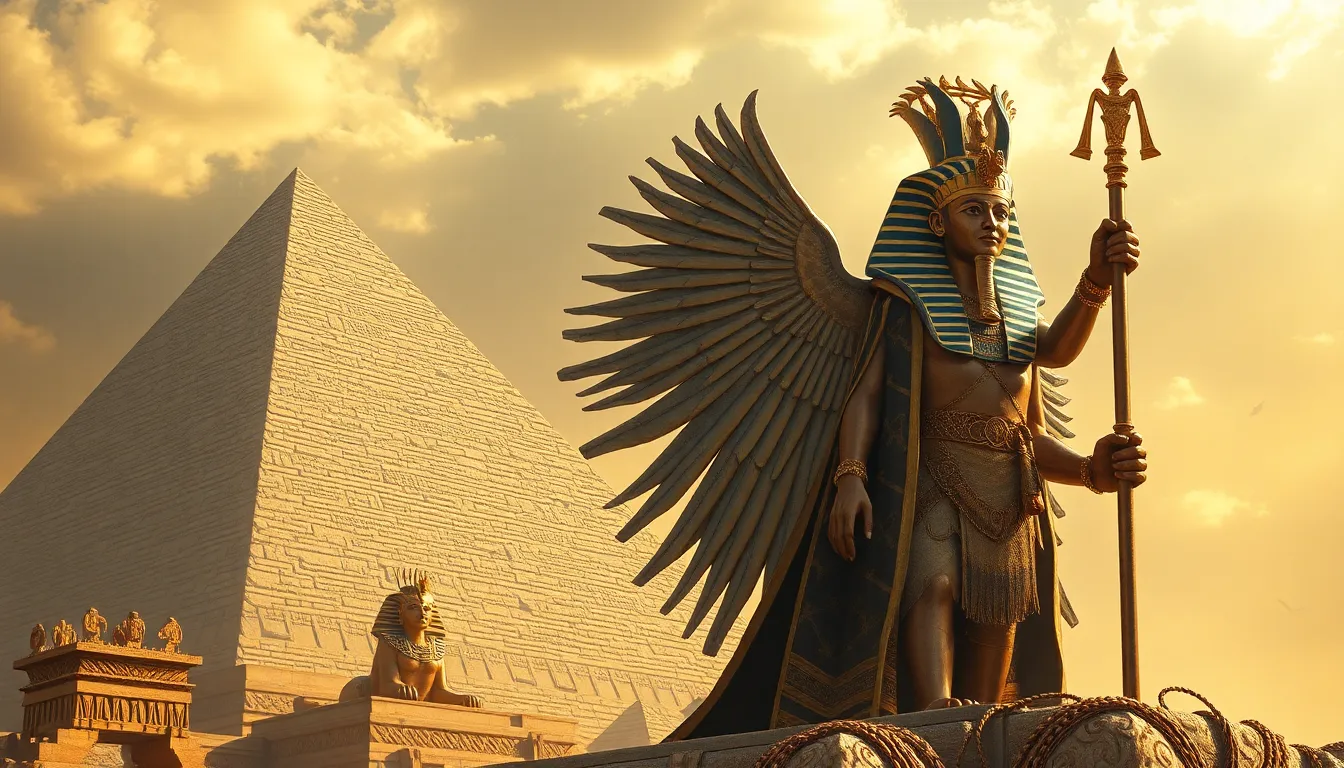The Pharaoh’s Divine Role in National Defense
I. Introduction
The role of the Pharaoh in ancient Egyptian society was pivotal, transcending mere governance to embody the intertwining of religion, politics, and military leadership. As both a political figure and a divine being, the Pharaoh was seen as the earthly representative of the gods, tasked with maintaining order and stability within the kingdom.
This article aims to explore the Pharaoh’s integral role in national defense, illustrating how divine authority and military leadership coalesced to protect and unify ancient Egypt.
II. Historical Context of the Pharaoh’s Authority
The foundation of the Pharaoh’s power can be traced back to the unification of Upper and Lower Egypt around 3100 BCE. This moment marked the beginning of a centralized authority under a single ruler, establishing a precedent for future Pharaohs.
- The unification of Upper and Lower Egypt: This unification was not just a political maneuver; it symbolized the merging of two cultures and identities, which the Pharaoh was expected to uphold and protect.
- Development of the divine kingship ideology: The Pharaoh was viewed as a god on Earth, a belief that reinforced his authority and the loyalty of his subjects.
- The Pharaoh as a symbol of national unity and strength: As a unifying figure, the Pharaoh represented the collective identity of the Egyptian people, embodying their hopes and aspirations.
III. The Divine Right to Rule
The divine right of the Pharaoh was deeply rooted in religious beliefs that endowed him with an unparalleled authority. This belief system not only legitimized his rule but also his military actions.
- Religious beliefs surrounding the Pharaoh’s divinity: The Pharaoh was considered a living god, and his actions were believed to be divinely guided.
- The concept of Ma’at: Central to Egyptian spirituality, Ma’at represented truth, balance, and order, which the Pharaoh was responsible for maintaining to ensure national stability.
- How divine authority legitimized military actions: The Pharaoh’s divine status provided justification for warfare, as battles were often framed as necessary to uphold Ma’at and protect the realm.
IV. Military Leadership and Strategy
As the commander-in-chief, the Pharaoh played a crucial role in military strategy and leadership. His presence on the battlefield was a source of inspiration for soldiers and a symbol of divine support.
- The Pharaoh as the commander-in-chief: Leading by example, the Pharaoh often participated in military campaigns, displaying both courage and divine favor.
- Key military campaigns led by notable Pharaohs: Some of the most significant military actions include the campaigns of Ramses II against the Hittites and Thutmose III’s numerous expeditions into Nubia and the Levant.
- The role of the Pharaoh in shaping military tactics and strategies: The Pharaoh’s strategic decisions were crucial for the success of military operations, often involving alliances and innovative tactics.
V. Symbolism and Propaganda in Warfare
The Pharaoh’s image as a warrior was meticulously crafted through various forms of art and propaganda, reinforcing his divine status and military prowess.
- Use of monuments and art: Grand monuments and temples were erected to portray the Pharaoh as a heroic figure, often depicted in scenes of battle.
- Significance of inscriptions and reliefs: Inscriptions detailing military victories and divine support served to promote the Pharaoh’s image and solidify his authority.
- Impact of religious rituals on military morale: Rituals conducted before battles were believed to invoke the gods’ favor, boosting the soldiers’ confidence and commitment.
VI. The Pharaoh’s Relationship with the Gods
The Pharaoh’s military endeavors were closely intertwined with religious practices aimed at securing divine favor for success in warfare.
- Rituals and offerings: To ensure victory, the Pharaoh often performed rituals and made offerings to the gods, seeking their blessing and protection.
- The role of priests: Priests were essential in supporting the Pharaoh’s military campaigns, conducting ceremonies to invoke the gods’ assistance.
- Major deities associated with warfare: Deities such as Horus and Sekhmet were invoked in times of conflict, symbolizing strength and protection.
VII. Case Studies of Pharaohs and Their Military Campaigns
Throughout history, several Pharaohs stood out for their military achievements and strategies that shaped the course of ancient Egypt.
- Ramses II and the Battle of Kadesh: Often hailed as one of the greatest military leaders, Ramses II’s battle against the Hittites at Kadesh was a significant event that showcased his leadership and tactical skills.
- Thutmose III and military expansion: Known as the “Napoleon of Egypt,” Thutmose III expanded Egypt’s territory through numerous successful campaigns, solidifying his reputation as a formidable ruler.
- Cleopatra’s alliances and defense strategies: Cleopatra VII utilized strategic alliances with Rome to defend her kingdom, demonstrating the ongoing importance of military leadership in Egypt’s history.
VIII. Conclusion
The Pharaoh’s role in national defense was multifaceted, encompassing religious, military, and political dimensions that were essential for the stability of ancient Egypt. His divine authority fostered a sense of unity and strength among the people, which was crucial in times of conflict.
Today, the legacy of the Pharaoh’s divine authority continues to influence modern interpretations of leadership, highlighting the importance of integrating spiritual beliefs with national security. The Pharaoh’s historical role serves as a reminder of the intricate relationship between governance and faith in the pursuit of a stable and secure society.




